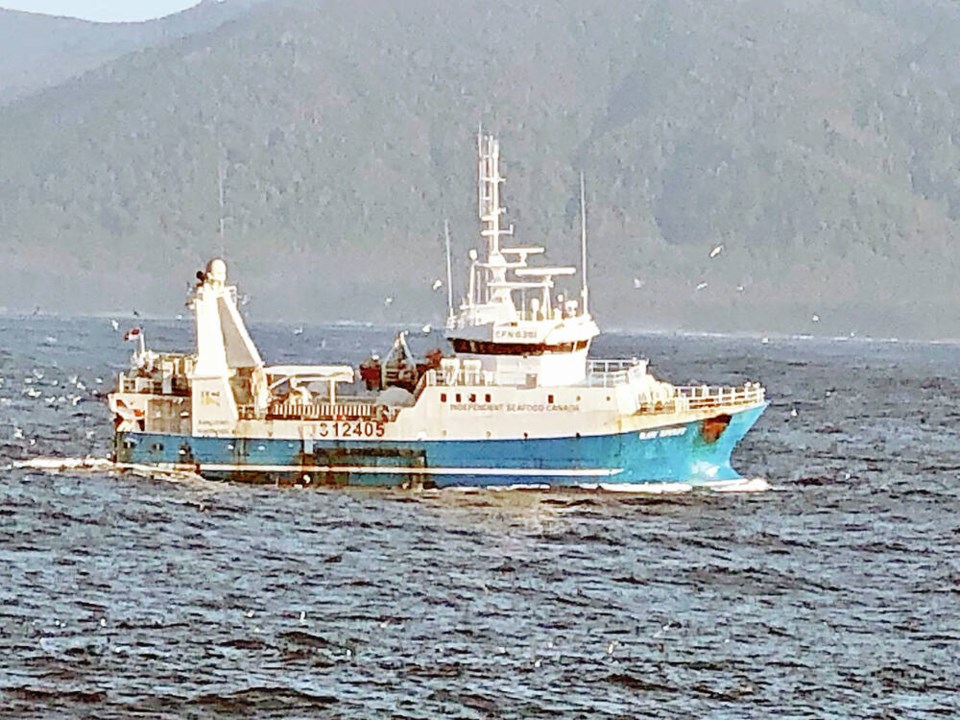When the chartered fishing vessel the Raw Spirit pulls out of Port Alberni this month, it will join three other vessels in an international expedition to understand the lives of salmon in the North Pacific.
More than $1 million was raised privately by B.C. scientists Brian Riddell and Richard Beamish to cover the cost of the fishing vessel joining the 2022 Pan-Pacific Winter High Seas Expedition. The venture is backed by governments, the Vancouver-based Year of the Salmon organization, the North Pacific Anadromous Fish Commission and academics.
It’s taking place under the cloud of increasingly dramatic climate effects around the globe. Scientists on the vessels will be investigating what that means for Pacific salmon and their ecosystems, as stocks to the south decline, while northern stocks are more robust.
This past week, the U.S. National Oceanic and Atmospheric Administration ship Bell M. Shimada sailed out of Port Angeles to head north. The Canadian Coast Guard’s Sir John Franklin, built in North Vancouver, and Russia’s R/V Tinro are also part of the expedition.
The venture follows the 2019 and 2020 International Gulf of Alaska expeditions, also tasked with understanding salmon in winter in the North Pacific. Riddell and Beamish organized and raised funds for those expeditions as part of the Year of the Salmon initiative.
The earlier expeditions discovered that coho salmon form huge schools in the North Pacific made up of stocks from B.C., Alaska and Russia. The fish leave their home streams in the late fall to head for the open ocean, where they gather in a giant school, Beamish said.
The expeditions also found pink salmon were not mixed up with other salmon, such as sockeye, in the middle of the Gulf of Alaska, but were farther south than expected.
This year’s joint expedition will help verify if low catches of salmon on the 2019 and 2020 expeditions were indicators of subsequent low returns.
Fishing companies in B.C. and the U.S. and B.C. First Nations donated to support the Raw Spirit’s participation, Beamish said. The largest backer was Vancouver’s Canadian Fishing Co.
Vessels are going to specific areas of the North Pacific. The Franklin and Raw Spirit will be closer to Alaska.
This is the largest such expedition staged to research salmon in the North Pacific.
“To me, this is the beginning of understanding the mechanisms that are regulating salmon abundance,” Beamish said.
He expects the 2021 commercial salmon catch in B.C. will once once again be low, marking three consecutive years of drastically low years. Beamish said there has to be a biological mechanism regulating this, just as there is a mechanism allowing for record catches in Alaska.
“I don’t think there is any dispute that there is something going on in the ocean and scientifically we don’t understand it.”
The Franklin and the Raw Spirit are using different fishing methods. The Franklin will be trawling — pulling a net through the water — while surface gillnets, hung like vertical walls in the water, and longlines will be used on the Raw Spirit.
That will allow scientists to assess the relevance of unexpectedly low trawl catches in the 2019 and 2020 expedition years. Comparing gillnet and longline catches with trawl catches will indicate how well the trawls reflect the abundance of salmon in the Gulf of Alaska in winter, the Raw Spirit’s cruise plan says.
Researchers on the vessels will carry out sampling and other tests, including analyzing salmon DNA, using fish scales to determine growth rates, looking at microscopic plankton, locating the numbers and various species of salmon, measuring temperature, salinity and oxygen levels in the water, checking on salmon predators and their numbers, and figuring out if enough salmon prey — such as squid — is available.
All data will be publicly available.
To follow the expedition on interactive maps and for more information, go to the Year of the Salmon website.



